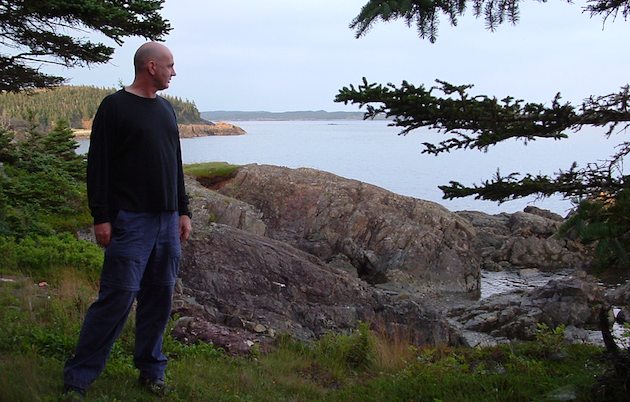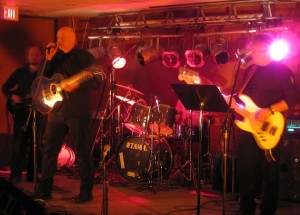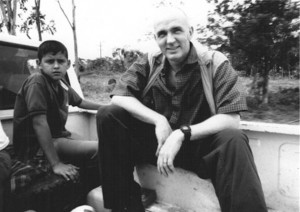
It’s an understatement to say that Garry Leech has lead a remarkable life. The South Bar resident and independent journalist forged a career by reporting in Colombia’s rural zones and the devastation wrought there by the country’s long-running civil war and the United States’ War on Drugs. He has authored several books and hundreds of articles on the subject, experience that he brings to his teaching position with the Political Science department at Cape Breton University.
But before his career in writing and journalism, Leech’s life in New York included being lead vocalist and songwriter for his band Spyder Jones, which performed in the city’s heady club scene in the mid 1990s. Moving to Cape Breton in 2004 eventually inspired a return to musical activities. Just this past March, Leech once again took up a role as lead singer/songwriter of the Misfit Boys. Leech’s fellow CBU professors Richard MacKinnon and Chris MacDonald respectively play bass and lead guitar, as well as each providing back-up vocals. Steve Melnick, a lawyer with Legal Aid Nova Scotia, acts as the Misfit Boys’ drummer.
Their latest appearance is scheduled for Saturday, June 26 at Governors Pub, along with Hash Jesus and the Ladyslippers. Showtime is 10pm and cover is $6. In the meantime, WGO sat down with Leech for a conversation on his music and his thoughts on entering the scene in Cape Breton.
WGO: So tell me where the name for the band came from.
LEECH: Originally when we put the band together it was going to be a one-off show. There a conference being held at CBU and there was going to be an after conference party with live bands like Tom Fun Orchestra. So I decided to put a band together, I got these musicians interested and the idea was to just learn eleven of my songs and play them. As for the name, last Christmas I was watching with my oldest son Owen “Rudolph the Red Nosed Reindeer and the Island of the Misfit Toys.” I though the Misfit Toys would be a great name for a band, so we used that name just with the band for that one gig.
After the gig in March, we decided that we wanted to keep the band going. So I did a Google search to make sure that the name wasn’t being used and I found an indie rock band that was making a name for itself in the US that had the name the Misfit Toys. We talked about changing the name and we decided that we liked the Misfit Toys, so rather than completely changing it we switched to “Boys” from “Toys.” I think it’s kind of fitting in an ironic way, the four of us come from very different backgrounds geographically and musically; a bunch of misfits that somehow fit together. And we’re not boys doing music anymore, y’know, we’re “mature” musicians.
WGO: If you had to describe the Misfit Boys’ sound….
LEECH: I’d say my biggest songwriting influences are early Elvis Costello and The Clash. If I have to say what our ‘sound’ is reminiscent of, it’s probably that late seventies British punk-pop new wave sound of the Clash and Elvis Costello, stuff like that. That’s the era when I was growing up in Britain and so it’s what influenced my songwriting the most.
We’ve all got really diverse backgrounds. Chris, the guitarist, is trained in classical guitar and has a classic rock background. Richard the bass player has mostly played blues, and the drummer Steve also has a classic rock background and has played in country bands. So it’s a really eclectic mix of musicians with a lot of experience that we bring to the table that’s created this original sound that The Misfit Boys has. As important as the songwriting and the technical ability of playing the songs is, energy to me one of the key components.
WGO: You had a band while in NY, and since then have done many other things with your life – journalism, moved here, had children. What’s it like to have a band again after all those experiences?
LEECH: It’s been a lot of fun because I loved performing with my band in New York back in the ’90s, and as you just mentioned, music got set aside for all these other projects I’ve been doing in my life. Ever since I’ve moved to Cape Breton six years ago, the musical culture here made me want to put together a band again. Having two kids kind of delayed that a bit, but I put the band together in March with Richard, Steve and Chris. We’ve been playing regularly since March and it’s been a lot of fun to do music again. It’s good to have the creative juices flowing again in that particular way as opposed to journalistic and political writing.
WGO: What’s it like playing here versus playing on the club scene in New York?

WGO: You’re bringing new compositions to the band, but you’re also bringing old material from when you played in New York, right?
LEECH: Yes, we’re up to 19 songs in our repertoire right now. About a third of the songs we do right now I did with my band in New York, a third is stuff I wrote that I never did with a band before, and now there are several new songs that I’ve written over the last few months since the new band has gotten together that we’re also incorporating into our acts. So it’s not only reinventing the old stuff with a new group of musicians, it’s also creating new songs too. It’s fun to get back into songwriting because I haven’t done a lot of that over the last decade.
WGO: What’s it like to revisit the older material that was written at a different point in your life?
LEECH: I have no problem doing the songs, they still resonate with me. It’s interesting bringing them to a new band and new musicians, and seeing how they interpret the songs. Some of [the songs] sounds remarkably similar to how my old band did them, and there’s a few songs that just sound dramatically different when I listen to recordings done back in the 90s with my old band. With the new band, they become radically different songs. All these musicians bring their own different thing to the table, which influences the arrangement and the final outcome of the song. So in a way it makes [the songs] fresh again, it’s like a rebirth of these songs.
WGO: For your new material, how have other aspects of your professional life influenced the songwriting?

WGO: What are some other projects that you have on the go?
LEECH: I’m [starting] a Masters of Sociology starting in September. Of course I have my two children, they keep me busy being two and four. I’m teaching part time at CBU. I’m writing a book too–the manuscript’s due at the end of August–on the largest guerrilla group in Colombia, and I’m editing a book right now for CBU Press. I’ve got a lot going on that’s keeping me busy, so I’m amazed I actually have time for music. The music is a wonderful kind of escape, it’s this really fun project in the midst of this more serious work that I’m engaged in.

